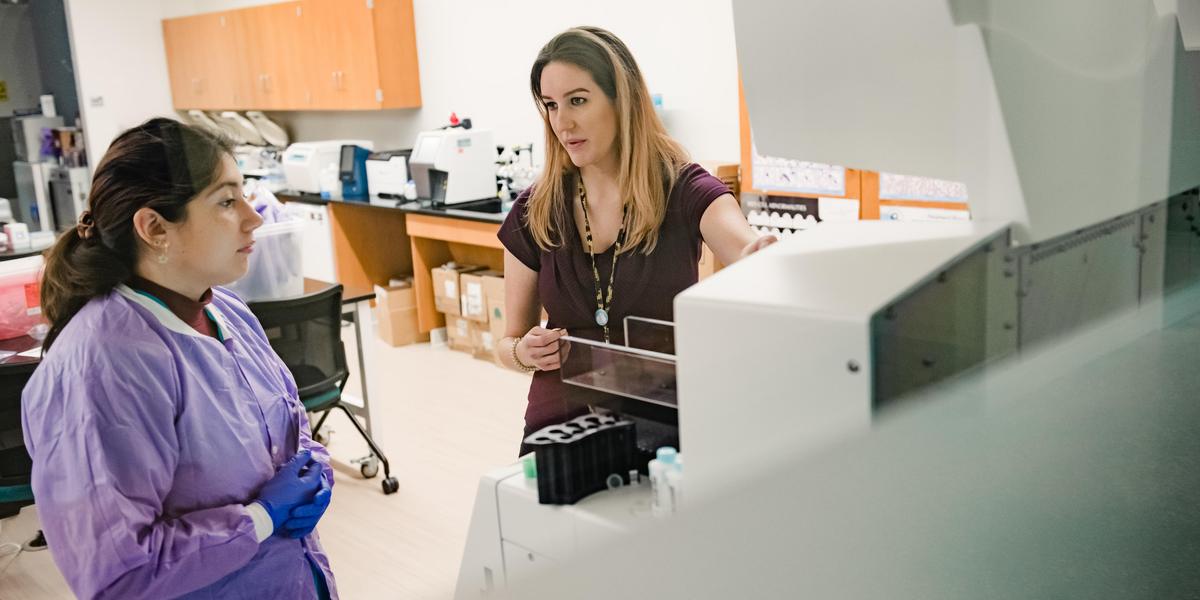
Consider pursuing a career as a Medical Laboratory Technician (MLT) and become a member of the laboratory team! Join our accredited program to become an MLT and you'll have opportunities to enter flexible healthcare careers in clinical laboratory science. As an MLT, you will analyze blood, body fluids and microbiology cultures; work up blood units for transfusions, operate automated equipment, instruments and analyzers; and conduct manual testing in accordance with federal laws, guidelines and national standards.
The Medical Laboratory Assistant (MLA) 29-credit certificate program provides the education needed to prepare students as trained MLA’s in a variety of clinical laboratory settings including hospitals, clinics and physician office laboratories.
Our Phlebotomy Technician program is 12 credits and teaches the principles and practice of venipuncture, skin puncturing and processing of samples for laboratory testing.
Through our program, our dedicated faculty will prepare you for entry-level employment in laboratory medicine to meet the current and the increasing demands for medical laboratory technicians.
We're proud to offer the following degree, credit certificate and letter of recognition:
Medical Laboratory Technician, A.A.S.
Medical Laboratory Assistant (certificate)
Christopher L. Harmon, MS, MLS(ASCP) CM
chair/assistant professor
410-777-7107
clharmon2@aacc.edu
HLSB 368G
Anne Arundel Community College's Medical Laboratory Technician A.A.S. Degree Program is accredited by the National Accrediting Agency for Clinical Laboratory Sciences (NAACLS). NAACLS is recognized by the Council for Higher Education Accreditation (CHEA).
NAACLS
5600 N. River Rd, Suite 720
Rosemont, IL 60018-5119
773-714-8880
Information related to the Medical Laboratory Technician (MLT) program’s clinical affiliates and/or policies and procedures related to students is provided during the MLT program's information sessions. It is also provided to students in their handbooks. For more information contact:
Christopher L. Harmon, MS, MLS(ASCP) CM
chair/assistant professor
410-777-7107
clharmon2@aacc.edu
Certification Examination Pass Rates
| Year | 2022 | 2023 | 2024 | 2025* |
|---|---|---|---|---|
| Number of Graduates | 15 | 9 | 13 | 10 |
| Number of graduates who sat for the ASCP exam within 1 year of graduation | 13 | 6 | 10 | Pending |
| Percentage of graduates who passed the ASCP exam within 1 year of graduation | 93% | 100% | 83.3% | Pending |
| Number of graduates who sat for the AMT exam within 1 year of graduation | 0 | 0 | 1 | Pending |
| Percentage of graduates who passed the AMT exam within 1 year of graduation | 0% | 0% | 100% | Pending |
| Total percentage of graduates who passed either exam within 1 year of graduation | 93% | 100% | 83.3% | Pending |
NAACLS benchmark is 75% pass rate within 1 year of graduation: AACC MLT Program 3-year cumulative pass rate is 92.1%
Graduation/Attrition Rates
| Year | 2022 | 2023 | 2024 | 2025* |
|---|---|---|---|---|
| Number of students who began the final half of the program | 16 | 12 | 17 | 9 |
| Number of students who began the final half but left before graduation | 1 | 2 | 1 | 0 |
| Yearly graduation rate of those students who began the first half of the program and completed the program | 93% | 83% | 94.1% | 100% |
NAACLS Benchmark: 3 years of graduation rates demonstrating an average of at least 70% of the students who enter the final half of the program, graduate from the program. AACC MLT Program 3-year cumulative graduation/attrition rate is 90.0%
Graduate Placement Rates
| Year | 2022 | 2023 | 2024 | 2025* |
|---|---|---|---|---|
| Number of graduates that found employment and/or continued their education within 1 year of graduation | 13 | 8 | 13 | Pending |
| Number of graduates that did neither of the above | 0 | 0 | 0 | Pending |
| Number of graduates whose employment status is unknown | 0 | 1 | 0 | Pending |
| Yearly Average Placement Rate | 100% | 100% | 100% | Pending |
NAACL Benchmark: 3 years of placement rates demonstrating an average of at least 70% of the students are employed within one year of graduation and/or have continued with their education. AACC MLT Cumulative graduation placement rate is 100%
The Anne Arundel Community College’s Medical Laboratory Technician (MLT) Program is proud of its program outcomes. Sharing this information meets accreditation requirements of the National Accrediting Agency for Clinical Laboratory Science (NAACLS).
*Updated: May 2025
Vision
To recruit, retain and graduate self-directed, self-determined, market- and career-ready citizens of the world who are “change leaders” in the field of clinical laboratory science.
Mission
To attract, nurture and prepare market- and career-ready medical laboratory technicians through excellence in program curricula, high-quality instructors and meaningful learning and clinical experiences that enhance student knowledge and meet market demands, enhance the health of the community, and promote lifelong learning.
Program Goals